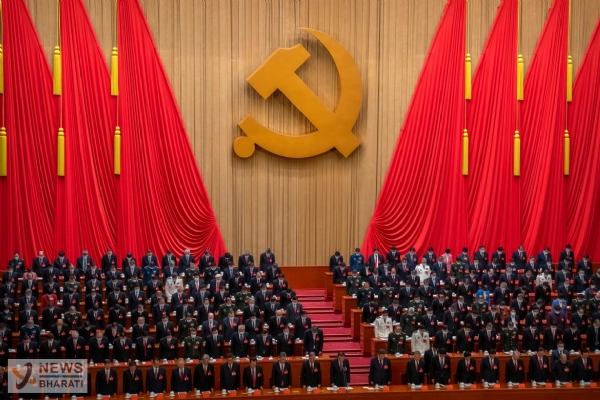What does China’s 20th Party Congress means for India?
ndia, being in the neighborhood and one of the strongest contenders who can challenge China’s global rise, will also have to bear the implications of these leadership changes and therefore, it is necessary for us to carefully gauge the military and economic policy implications of this Congress.
Total Views |
The 20th edition of the Chinese Communist Party (CCP)’s quinquennial Congress recently concluded in Beijing. It confirmed Xi Jinping’s centralization of power and his status being elevated at par with China’s first paramount leader Mao Zedong. It is indeed true that Xi Jinping has amassed unchallenged power by appointing his trusted allies to all key positions in the State as well as in the Party. Moreover, he has also ousted his factional rivals from Shanghai and Youth league groups and thus, gathered only yes-men around him.

This will be heavily reflected in China’s future policies and will have far-reaching implications not only for China but also for the whole world in the coming years. India, being in the neighborhood and one of the strongest contenders who can challenge China’s global rise, will also have to bear the implications of these leadership changes and therefore, it is necessary for us to carefully gauge the military and economic policy implications of this Congress. It is also important for India now to be more aware after Xi Jinping’s direct emphasis on winning “local wars” (hinting at China’s conflicts with Taiwan and India) in the work report presented at the 20th Party Congress. Along with this, China’s military modernization program will also have consequences for India’s border security.
‘Qi Fabao’ incident
The Party Congress started with an alarm for India when the presentation of China’s achievements in the past five years included the Galwan incident which featured Colonel Qi Fabao. Col Qi had led Chinese troops during the Galwan clash and reportedly suffered heavy injuries. When the Chinese government officially acknowledged in February 2021 about deaths that occurred during this incident on the Chinese side, Colonel Qi Fabao became a popular name in China. Chinese State media also released a video showcasing this incident and praised their soldiers. Colonel Qi also received several honors and awards from the Chinese military and the CCP as well.
However, India was angered when Col Qi Fabao participated as a torchbearer in the Beijing Winter Olympics. It was seen as a politicization of the Olympics by China and resulted in India’s diplomatic boycott during the Olympics. Further, India became more cautious when Qi Fabao was listed among 2296 delegates to 20th Congress. It is considered a great honor in China to be elected as a delegate from over 90 million CPC cadres. Qi Fabao was also among 710 delegates who had received honors from the Party for their meritorious services to China. Thus, it indicated the high importance given by China to events happening at India’s borders. Moreover, this act is expected to further stall limited progress in border disengagement talks and shows China’s unwillingness to resolve border disputes soon.
Personnel changes in top military positions
As Xi Jinping began his unprecedented third term as the General Secretary of the CPC and Chairman of the Central Military Commission (CMC), he has also appointed experienced personnel to key positions in the Chinese military. One of the topmost military officials in China is Vice-Chairman of CMC General He Weidong who has also gotten a position in China’s top decision-making 24-member Politburo. Although he currently works as Commander of China’s Eastern Theater Command which oversees Taiwan affairs, his previous posting was in Western Theater Command (WTC) as the Commander of Ground Force which was engaged in the 2017 Doklam crisis. Thus, he has first-hand experience in dealing with India which is expected to be considered in China’s border policy in the coming years. Other than He Weidong, there are also quite a number of military officials who have found a place in the Central Committee and these officials will also take part in the voting process on important decisions. For instance, the present Commander of WTC Wang Haijiang, political commissar of WTC Li Fengbiao, Commander of Tibet military region Wang Kai and Wang Hajiang’s predecessor Xu Qiling – all have earned a place in China’s elite policymaking body. These officials will have considerable influence on China’s India policy at least from a border security perspective. Moreover, the promotion of China’s current Foreign Minister Wang Yi to the Central Foreign Affairs Commission (CCP’s top foreign policy body) also hints at the continuation of China’s wolf warrior diplomacy vis-à-vis India. Hence, personnel changes in China’s top leadership certainly indicate China’s emphasis on its Indian policy.
China’s self-reliance and its impact on India
Xi Jinping called for technological self-reliance during his speech at the opening of the 20th Party Congress, in his efforts to make China a superpower. Even though he has not mentioned any specific areas of self-reliance, experts suggest that areas like semiconductors, lithium batteries, and AI products are in China’s priorities. These industries are also crucial for India to transform into a modernized economy. If China succeeds in its efforts to achieve self-sufficiency in these critical sectors, it can increase India’s dependency on China. This will also counterbalance India’s efforts to decouple from China with the help of initiatives like the Supply Chain Resiliency Initiative or Indo-Pacific Economic Framework. Although China’s domestic economy is currently on the decline owing to excessively rigid pandemic management and other structural issues, India should not underestimate China’s economic power and should prepare itself to counter any policies by China capable of negatively impacting the Indian economy. For this to achieve, India’s self-sufficiency drive and strengthening supply chain resilience should go hand in hand. In a nutshell, the 20th Party Congress has strengthened Xi Jinping’s power in China. This will be soon reflected in China’s policymaking which will be largely in continuation of previous trends but will be supplemented by more hard-line actions. India should be aware of China’s actions in terms of military and economy for which the 20th Party Congress left behind many hints. This Congress in China also serves as an opportunity for India to readjust its China policy to make it more robust to counter any future China challenge.


